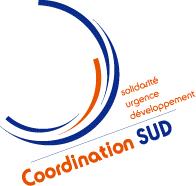 Mobilization for the European elections: “Let’s vote for a fair and responsible Europe in the world! ” Coordination SUD is targeting primarily candidates and political parties in the context of the coming European elections. Candidates are asked to sign a Charter for a fair and responsible Europe based on Manifesto, fully in line with the CONCORD Manifesto. Through this mobilization, candidates rally in promoting North-South solidarity in the European institutions. The Charter will be used to engage with candidates after the elections and throughout the 2009-2014 term of the European Parliament. Coordination SUD, the French national NGDO platform, is currently meeting the main French political parties. Local groups and activists are part of the mobilization to get candidate MEPs to sign the charter. News (May 7th 2009):
Mobilization for the European elections: “Let’s vote for a fair and responsible Europe in the world! ” Coordination SUD is targeting primarily candidates and political parties in the context of the coming European elections. Candidates are asked to sign a Charter for a fair and responsible Europe based on Manifesto, fully in line with the CONCORD Manifesto. Through this mobilization, candidates rally in promoting North-South solidarity in the European institutions. The Charter will be used to engage with candidates after the elections and throughout the 2009-2014 term of the European Parliament. Coordination SUD, the French national NGDO platform, is currently meeting the main French political parties. Local groups and activists are part of the mobilization to get candidate MEPs to sign the charter. News (May 7th 2009):
 More than 150 candidates have already signed the Charter, mostly from the Socialist and Green groups.
More than 150 candidates have already signed the Charter, mostly from the Socialist and Green groups.
7 May: “Everything about the training of Bioforce, the school’s commitment to humanitarian” – Lyon. An information meeting to learn about training Bioforce (Logistician, Director, Project Management, Water Sanitation Technician, Humanitarian Program Management, General Services Officer Humanitarian Logistics, pedagogical approach, opportunities and employment opportunities. All questions are welcome!
Thursday 14 May at 18h15 at the Institut Bioforce Développement 41 avenue du 8 mai 1945 69694 cedex Venissieux. Contact: formation@bioforce.asso.fr. More: www.bioforce.asso.fr
9 -24 May: The “Fair Trade Fortnight” is the key period during which many events are organized to raise awareness  about fair trade in France.The activities proposed during the Fortnight take diverse forms: advocacy campaigns, films, debates and tastings in shops and supermarkets, meetings, exhibitions, launching of new products. These activities help to meet the public, consumers and policy makers and economic policies to promote responsible, respectful Southern producers and the environment. Contact: formation@bioforce.asso.fr – www.quinzaine-commerce-equitable.fr
about fair trade in France.The activities proposed during the Fortnight take diverse forms: advocacy campaigns, films, debates and tastings in shops and supermarkets, meetings, exhibitions, launching of new products. These activities help to meet the public, consumers and policy makers and economic policies to promote responsible, respectful Southern producers and the environment. Contact: formation@bioforce.asso.fr – www.quinzaine-commerce-equitable.fr
12 May (from 9am to 18pm): Seminar on “European Policies in Euro-Mediterranean region: current and future challenges“ – Paris: The Euromed Network France (REF), the French section of the platform Non Governmental Euromed (PFNGE) is organizing a working seminar at the representation of the European Parliament and the European Commission in Paris, 288 bvd St Germain des Prés. This event is part of the campaign “10 days 4 Development”. It will bring together some sixty people involved in various capacities in co-operation, solidarity, cultural and sporting exchanges. Will be present, among others, Michel Tubiana, Secretary General of the PFNGE and Honorary President of the Ligue des Droits de l’Homme, Catherine Wihtol de Wenden, Research Director at CNRS, Paul Balta, University and author of numerous books on the Euromed region, Giovanna Tanzarella, Delegate General of the Fondation René Seydoux, among others … The Committee for the Partnership with Continental Europe will join the seminar to bring dimension of the European Neighborhood Policy. At the end of this seminar later in the day, an invitation will be launched in the candidate / es in the European elections on national and regional level to express their views on this important area s and what they would do if they were elected to the European Parliament. Program. 
12 May: Coordination SUD a letter to Prime Minister, to alert the government about the importance of France duty of international solidarity as the countries most affected by the economic consequences of the financial crisis are the poorest countries. However, the effort of France in terms of official development assistance does not meet its pledge. The preparation of the budget bill for 2010 is an opportunity for France to fulfil its promises.
14 May: Diffusion to the journalists of CONCORD Aid Watch report on the reality of the aid delivered by the European Union and its Member States to developing countries.
15 May: Coordination SUD organised a debate on the the role of Europe in the World with 5 list leaders on May 15th. See Press release.
You can watch the debate which was recorded lived from the French Senate.
Vodpod videos no longer available.
More on the mobilisation; Contact: Gipsy BELEY, beley@coordinationsud.org , +33 (0)1 44 72 84 55
May:A few weeks of the European elections, RFI and Coordination SUD publish the book “Regards du Monde sur l’Europe”, published by Karthala following the conference, 30 October 2008, this book brings together the thoughts and expectations of academics, designers, journalists, trade unionists, NGOs, parliamentarians, politicians around the world vis a vis of Europe. More: http://coordinationsud.org/spip.php?article14167
Contact : Florent Sebban, sebban@coordinationsud.org
The campaigns of members of Coordination SUD
Several members of Coordination SUD have launched campaigns around the European elections on specific issues, enhancing the mobilization of the national platform Coordination SUD.
The CFSI (French committee for international solidarity), in cooperation with other European organizations, is calling for coherent policies for the fight against hunger and for sustainable farming in the South.
The collective “Des ponts pas des murs” launches a campaign to raise awareness and ask the candidates to agree on policies that respects the rights of migrants. It is time to face the impact of the immigration policies imposed by the European Union,
CCFD – Terre Solidaire – Oxfam France – Agir ici launches a campaign called “Hold up international – For a Europe that regulates its multinationals”. The campaign seeks a reform of the European legal framework to limit the negative impact of multinationals and encourage their actions to contribute to the development of Southern countries.
Peuples Solidaires launches an awareness campaign challenging the candidates for European elections in June 2009 about “access to land, a North – South issue for Europe.” The idea is to put on the EU agenda the right to land, which is the basic condition to reach food sovereignty.
17 – 19 June: Fair of the sustainable development & Crafts – Paris: this fair gathers of public and private decision makers in search of environmental solutions with high added value. It proposes sustainable eco-innovative solutions in 8 sectors (construction, Transport, Energy, Waste, Water, Agriculture, Chemicals and Services), and a series of conferences. More about it: www.semd.fr
8 – 10 July: Monitoring by the French NGOs of the G8 Summit 2009, Maddalena (Sardinia, Italy)
The French NGOs, together with their counterparts from the G8 countries in particular, the platform of the Italian NGO will monitor the issues on the agenda of the G8 and provide their view to the French government. More: http://www.coordinationsud.org/spip.php?article12141
2 – 4 October: European Fair Trade Fair. Equi’Sol, association for the promotion of fair trade, and its national and European partners, launched the 2nd edition of the Fair Trade Fair in Europe. More: http://www.coordinationsud.org/spip.php?article12700

For more information, contact the national platform:
Coordination SUD: 14, passage Dubail, 75010 Paris – Tel.: 33 1 44 72 87 13 – Website: www.coordinationsud.org










 Each year, CONCORD monitors the quality and quantity of the aid delivered to developing countries
Each year, CONCORD monitors the quality and quantity of the aid delivered to developing countries





















 The Finnish NGDO platform to the European Union – Kehys – has set up a
The Finnish NGDO platform to the European Union – Kehys – has set up a 










 Mobilization for the European elections: “Let’s vote for a fair and responsible Europe in the world! ” Coordination SUD is targeting primarily candidates and political parties in the context of the coming European elections. Candidates are asked to sign a
Mobilization for the European elections: “Let’s vote for a fair and responsible Europe in the world! ” Coordination SUD is targeting primarily candidates and political parties in the context of the coming European elections. Candidates are asked to sign a  More than 150 candidates have already signed the
More than 150 candidates have already signed the  about fair trade in France.The activities proposed during the Fortnight take diverse forms: advocacy campaigns, films, debates and tastings in shops and supermarkets, meetings, exhibitions, launching of new products. These activities help to meet the public, consumers and policy makers and economic policies to promote responsible, respectful Southern producers and the environment. Contact:
about fair trade in France.The activities proposed during the Fortnight take diverse forms: advocacy campaigns, films, debates and tastings in shops and supermarkets, meetings, exhibitions, launching of new products. These activities help to meet the public, consumers and policy makers and economic policies to promote responsible, respectful Southern producers and the environment. Contact: 


